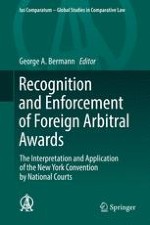2017 | OriginalPaper | Buchkapitel
Interpretation and Application of the New York Convention in Taiwan
verfasst von : Rong-Chwan Chen
Erschienen in: Recognition and Enforcement of Foreign Arbitral Awards
Aktivieren Sie unsere intelligente Suche, um passende Fachinhalte oder Patente zu finden.
Wählen Sie Textabschnitte aus um mit Künstlicher Intelligenz passenden Patente zu finden. powered by
Markieren Sie Textabschnitte, um KI-gestützt weitere passende Inhalte zu finden. powered by
